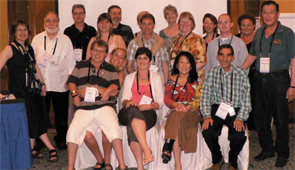
These OMERACT patient research partners have been identified by their personal rheumatologists as people who could make a contribution to the OMERACT process of data-driven debate and consensus building. Although many have technical skills, such as mentorship or statistics, the real added value they bring is their personal experience of having lived with their condition. Readers of this article who are living with their own medical condition will readily understand that no amount of theoretical knowledge can replace the special perspective that a patient brings. To capture this perspective and include it in their work, researchers face two new challenges: how to identify, recruit, and support patient research partners; and how to listen to what they are saying and recognize when it widens and deepens our understanding of an issue. A group of OMERACT patients and researchers have published an account of the lessons learned from our endeavors, and one patient partner is currently undertaking a PhD, studying the personal and organizational adjustments that have been integral to the process.6
Where next with patient participation? OMERACT recently adopted the policy that patients should be involved in all working groups in one way or another. For some, such as technical groups looking at MRI sequences or biomarker requirements, this involvement will occur principally at the OMERACT biannual meetings. But, for most groups, such as my own working group on outcomes for polymyalgia rheumatica (PMR), we expect patients to participate at every stage and at every level. For the PMR Working Group, the first presentation at the initial meeting was from a patient, and the first piece of work was a consultation exercise with over 100 patients at five centers in Europe to discover the outcomes of importance to patients themselves. The OMERACT Filter, the book of rules that explains how relevant outcome measures should be chosen and measured, is currently under review, and an updated Filter will be proposed at the next OMERACT conference.7 One major development will be the explicit instructions on the inclusion of the patient perspective for all future OMERACT core sets.
Dr. Kirwan is professor of rheumatic diseases at the University of Bristol, Bristol, United Kingdom. He is also the OMERACT patient perspective coordinator.
References
- Outcome Measures in Rheumatology. www.omeract.org. Accessed September 6, 2011.
- Boers M, Tugwell P, Felson DT, et al. World Health Organisation (WHO) and International League Against Rheumatism (ILAR) core endpoints for symptom-modifying antirheumatic drugs in rheumatoid arthritis clinical trials. J Rheumatol. 1994;21:86-89.
- Kirwan J, Heiberg T, Hewlett S, et al. Outcomes from the Patient Perspective workshop at OMERACT 6. J Rheumatol. 2003;30:868-872.
- Kirwan J, Minnock P, Adebajo A, et al. Patient Perspective Workshop: Fatigue as a recommended patient-centred outcome measure in rheumatoid arthritis. J Rheumatol. 2007;34:1174-1177.
- Kirwan J, Newman S, Tugwell P, et al. Progress on incorporating the patient perspective in outcome assessment in rheumatology and the emergence of Life Impact Measures at OMERACT 9. J Rheumatol. 2009;36:2071-2076.
- Hewlett S, Wit M, Richards P, et al. Patients and professionals as research partners: Challenges, practicalities and benefits. Arthritis Rheum. 2006;55:676-680.
- Boers M, Brooks P, Strand CV, Tugwell P. The OMERACT Filter for outcome reasures in Rheumatology. J Rheumatol. 1998;25:198-199.

